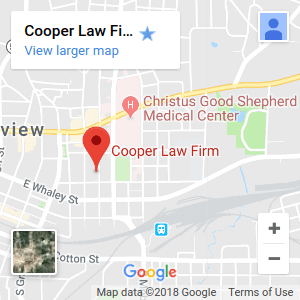
The Cooper Law Firm are truck accident lawyers in Texas who work with victims who have been injured in truck crashes. There are many factors that can contribute to truck accidents. Sleep apnea is just one of them. If you or a loved one was injured in a truck accident because a driver was fatigued due to sleep apnea, you and your family may be entitled to seek damages for your medical expenses, rehabilitation costs, lost wages, and pain and suffering damages.
According to the Federal Motor Carrier Safety Administration approximately one-third of all truck drivers may have sleep apnea. Sleep apnea is a disorder that can result in interrupted breathing while a person is sleeping. These short periods of time when a person stops breathing can last as long as 10 seconds and, according to the Federal Motor Carrier Safety Administration, breathing can stop as many as 400 times each night. Sleep apnea can occur for many years, disrupting a person’s sleep without diagnosis. This condition can leave a person fatigued even after a full night’s sleep because it can interrupt sound sleep. Individuals with the condition may report getting a full night’s rest, but still report feeling tired in the morning. Safety experts recommend that all truck drivers get tested for sleep apnea, but currently sleep apnea screening is not part of the regular commercial driver’s license physical screening. Risk factors include heavy weight, family history of sleep apnea, age, and having a larger neck. At the end of the day, it is often up to the truck driver to tell his or her doctor if he or she is experiencing fatigue or has noticed any of the signs of sleep apnea. Often victims of sleep apnea aren’t aware they have the condition. A doctor or partner may need to identify the signs (stopped breathing during sleep) to get a diagnosis.
The Cooper Law Firm are truck accident lawyers in Texas who understand that many diverse factors can contribute to a truck accident. However, if undiagnosed sleep apnea was a factor that led to your driver’s fatigue, you may have certain rights under the law when it comes to seeking damages and compensation for your crash. While federal regulations don’t require drivers to undergo screening for sleep apnea, truck companies are well aware that one-third of their drivers may have the condition. Companies that fail to screen drivers for the condition or who fail to take steps to ensure that drivers get a quality night’s rest could be held responsible for truck accidents that take place due to driver fatigue. If you or a loved one were hurt in a semi-truck accident in Texas, protect your rights. Contact the Cooper Law Firm, truck accident lawyers in Texas today. Our firm offers new clients a free initial consultation during which we can review your case and claim and help you take the next steps to protect your rights.
What are Risk Factors for Sleep Apnea? What are the Signs?
Many truck drivers can safely operate a truck if their sleep apnea is properly diagnosed and treated. Yet, what are the signs of sleep apnea and what can truck companies, drivers, and doctors do to ensure that truck drivers are receiving treatment for the condition? Risk factors for sleep apnea include a family history of the condition, being overweight, being over age 40, and smoking or alcohol use. Symptoms of sleep apnea can include:
- Loud Snoring
- Headaches Upon Waking
- Choking or Gasping While Sleeping
- Feeling Tired During the Day
- Depression
- Feeling Irritable (often due to lack of sleep)
- Frequent Wakefulness
- Memory Issues
Sleep apnea can affect a truck driver’s ability to safety operate a motor vehicle. When sleep is interrupted, drivers cannot get the rest they need to be properly focused during the day or while driving. This can lead to reduced reaction time, problems focusing, and poor driving performance. While many sleep apnea sufferers will never fall asleep behind the wheel, fatigued driving can be incredibly dangerous and can put a truck driver at greater risk of a truck crash. Motor carriers who know that a driver has sleep apnea should not permit the driver to operate a motor vehicle until the driver has received proper treatment.
The Cooper Law Firm are truck accident lawyers in Texas who can evaluate your truck accident and see whether fatigue may have played a role. If driver fatigue was a factor in your accident, you may be entitled to seek damages for your losses. However, you may only have a limited amount of time to make a claim and truck accident claims can often be complex and may also involve may laws specific to truck drivers and companies. The Cooper Law Firm are semi-truck accident lawyers in Texas who can help you and your family navigate the claims process. Contact us today to learn more.
Despite Lack of Regulations, Truck Companies Might Still Be Responsible for Sleep Apnea Accidents in Texas
Currently, there is no formal regulation that requires that truck drivers be screened for sleep apnea. Because there are no formal requirements, testing is often left up to individual truckers. These tests can be costly and not all truckers may undergo them. Truck companies that fail to shoulder these costs or that fail to test at-risk drivers could potentially be held liable if they were aware that drivers could have had sleep apnea that could have led to driver fatigue and truck accidents. Drivers who do have sleep apnea may also be forced to shoulder the cost of treatment on their own, which can cost in the thousands of dollars. When regulations fail to promote the safety of an industry, it is often up to families and victims to hold truck drivers and truck companies accountable. Truck companies have a responsibility to ensure that their drivers are safe and well-rested.
The Cooper Law Firm are truck accident lawyers in Texas who may be able to help you and your family seek damages for your losses following a truck accident. However, you may only have a limited amount of time to make a claim and to seek justice under the law. Contact the Cooper Law Firm, truck accident lawyers in Texas today for a free initial consultation and to learn more about your rights and options under the law.


